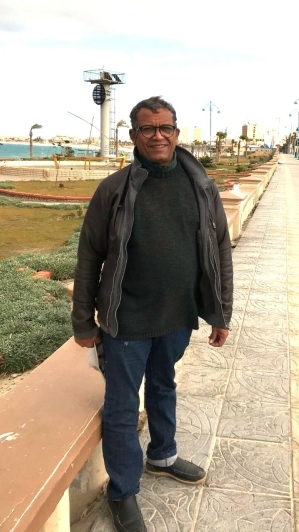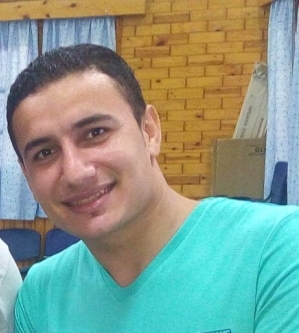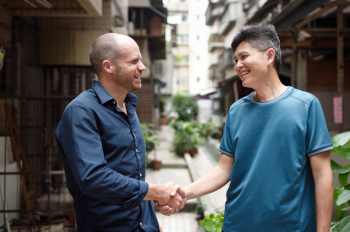
A Christian refugee in Egypt arrested for his faith and imprisoned alongside Islamist criminals has been denied medical care for heart and liver ailments despite complaining of chest pains as recently as April, sources said.
Authorities arrested Abdul-Baqi Saeed Abdo on Dec. 15, 2021 from his home in Cairo for sharing about his conversion on a Christian TV program and contributing to a Facebook group for converts. He was charged under an Egypt law that prohibits derogatory comments about Islam, Judaism and Christianity, and a terrorism law that has been widely used without basis against those authorities deem undesirable, according to rights groups.
“In April 2024, he was denied medical treatment by prison authorities after reporting chest pains,” the U.S. Commission on International Religious Freedom (USCIRF) reports on its website. “Abdo is married with children.”
Abdo had fled his native Yemen for Egypt in August 2014 when his life was endangered after Yemeni Muslims learned of his conversion to Christ the previous year, USCIRF stated. Leaving Islam is punishable by death in Yemen. Amnesty International voiced an appeal for Abdo, in his mid-50s, in September.
“After he announced his conversion to Christianity on his social media platforms in 2013, he and his family who lived in a rural area outside Taiz were subjected to a wave of violent attacks,” Amnesty International reported. “Members of his family told Amnesty International that he was fired from his job, his car was damaged, and that in June 2014 his home was set on fire and his wife passed away as a result of this attack. In August 2014, he fled Yemen to Egypt with his four children.”

More than two years after his arrest in Egypt, Abdo is still held “solely for exercising his rights to freedom of expression, conscience and belief and must be immediately released,” as Amnesty stated in September. “Any plans to deport him must be halted.”
Shortly after Abdo’s arrest in Egypt, a prosecutor with the Supreme State Security Prosecution (SSSP) ordered pre-trial detention pending investigations on charges of “joining a terrorist group with knowledge of its purposes” and “defamation of the Islamic religion,” according to Amnesty.
“These charges are in connection to his conversion to Christianity, about which he regularly posted on his social media platforms since fleeing from Yemen to Egypt in 2014,” the group reported. “Since his arrest in December 2021, his pretrial detention has been extended without providing him with an opportunity to meaningfully challenge the lawfulness of his detention.”
Legal advocacy group Alliance Defending Freedom International (ADF) has called on officials in Egypt to release Abdo and another Christian, Nour Girgis, who was also arrested in 2021 for leading the Facebook group dedicated to supporting converts to Christianity from Islam.
“Authorities arrested the men after discovering their affiliation with the page, spuriously linking their involvement with terrorism activities,” read an ADF International press statement. “The two men have been moved around to different detention centers while awaiting their repeatedly postponed criminal trials. In addition to the very poor conditions which have negatively impacted their physical health, they only have been allowed occasional visits from their families and legal counsel.”
ADF International is supporting their legal defense and advocating for their release through international legal mechanisms. Girgis, an Egyptian national who worked for a pharmacy, has reported suffering humiliation and torture by prison guards, according to ADF International.
Girgis’ employer had told him to report to a police station in November 2021, and when he did so, officials held him incommunicado for 40 days, the group said.
“He was then transferred to the Terrorism Unit, where a prosecutor verbally informed him that he was being held under the terrorism laws for leading a Facebook group named “Al Abareen” [“to cross over” in Arabic], and because he had allegedly blasphemed against Islam,” ADF International reported. “Girgis has been repeatedly interrogated about his activities and whether he has any links to Western organizations.”
His trial date has been repeatedly delayed, and he has not had the opportunity to prepare sufficient defense with his attorney, the group said.
“The arbitrary detention of these two Christian men without trial constitutes a severe violation of their human rights,” said Elizabeth Francis, legal counsel for ADF International’s Global Religious Freedom team. “The peaceful expression of one’s religious convictions is not terrorism. No one should be imprisoned for supporting Christian converts, let alone be told that they are a national security risk for expressing their beliefs.”
ADF International is calling on officials in Egypt to abide by its international human rights obligations and immediately ensure that both men receive a fair trial and a safe and speedy return to their families, said Kelsey Zorzi, director of Advocacy for Global Religious Freedom for ADF International.
“The rights to religious freedom, free expression, and a fair trial are all enshrined in international law, and Egyptian authorities have blatantly violated these basic rights by detaining these men and prolonging their imprisonment,” Zorzi said. “It is past time for these men to be released.”
ADF International has submitted information to the U.N. Working Group on Arbitrary Detention on behalf of Girgis and Abdo, asserting that both Christians have been deprived of their right to religious freedom and a fair trial under international law.
Article 98(f) of Egypt’s penal code outlaws insulting a “heavenly religion,” namely Islam, Christianity and Judaism. Violators face up to five years in prison under the law, which calls for a minimum of six months of prison.
The law, which functions essentially as Egypt’s “blasphemy” legislation against insulting religion, has come under fire for violating the country’s constitutional guarantees of freedom of expression and religious freedom. Used almost exclusively against criticisms of Islam, the law is rarely invoked against frequent, public anti-Christian comments.
The law has also been criticized as arbitrary and unclearly defined. Supporters of the law, mostly Islamists and government officials, say it is meant to dissuade and punish those in Egypt who use religion to instigate “strife and division” or spread “disdain and contempt for any of the revealed religions or the sects belonging thereto.”
Rights advocates have said the law needs to distinguish between honest critique of religion and speech explicitly meant to incite violence, but that in any event judges and police are biased toward Muslims and against Coptic Christians. Human rights activists in Egypt and abroad say the blasphemy statute violates basic standards of human rights and is most often used to stifle free speech or as a weapon by members of the Sunni Islamic majority to attack religious minorities such as Coptic Christians.
Since the Egyptian constitution was passed in 2014 by referendum, there have been numerous, high-profile blasphemy cases filed against Coptic Christians on charges that were either fabricated or completely false, human rights activists said.
Egypt ranked 38th on Open Doors’ 2024 World Watch List of the 50 countries where it is most difficult to be a Christian.





